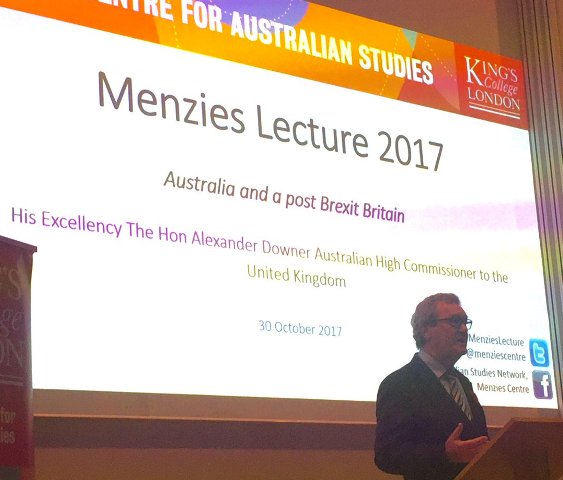 Australia and a post-Brexit Britain: "We would like to see other parts of our relationship develop" [photo: Alexander Downer on Twitter]
Australia and a post-Brexit Britain: "We would like to see other parts of our relationship develop" [photo: Alexander Downer on Twitter]
[This article, which appears in full in the Round Table Journal, is based on the Robert Menzies Lecture delivered in October 2017.]
Taking Britain out of the European Union for us will mean losing that point of view in the councils of Europe. There is no doubt about that. It will mean that the European Union itself will not be quite so transatlantic; it will not be quite as outward oriented as it is when Britain is a member of the European Union. We are much less judgemental and we were much less concerned about the economic issues than we were about that particular question.
Our view now is that the decision is made and we assume that the passing of British membership in the European Union will go through and that Britain will leave the European Union formally at the end of March 2019 regardless of whether there is some transitional arrangement or other after that. Now, we do not get into all of the details of the negotiations between the United Kingdom and the European Union. We offer no useful commentary on all of that. I think it would be inappropriate for us to do that. Nevertheless we follow it and we follow it with a keen interest.
When the referendum came, our Prime Minister rang me and asked what our best positioning was now, conscious of course as he was, that along with the likes of President Obama, he had said Britain should remain in the European Union – and the British public had studiously ignored him. I said we need to secure our economic equities. So one of the things we should do is say that when the time is right we would be prepared to negotiate a free trade agreement with the UK.
Subsequently, when the time was appropriate, he made that offer and the British Government under the newly minted Prime Minister, Theresa May, was quick to take up that offer. Of course, we recognise that the UK is still a member of the European Union and cannot under EU Law negotiate trade agreements with third parties on its own. Nevertheless we have had some preliminary discussions through what we call a Trade Working Group. We have had three rounds of these preliminary discussions with the Department of International Trade about the trade policy that the UK will have once it leaves the EU, Britain’s positioning in the world in terms of international trade, the sort of role Britain could play in the World Trade Organisation [WTO] and so the list goes on. These have been very preliminary talks and have been nothing akin to a formal negotiation with the UK.
People often ask me whether I think it would be easy for us to conclude a free trade agreement with the UK. I answer by saying we concluded a free trade agreement with the United States in just 15 months because both sides knew exactly what they wanted out of the agreement. To use a phrase, we knew that free trade meant free trade.
We carved very little out of the free trade paradigm in those negotiations. The Americans carved out the sugar industry, there were some phasing arrangements and so on. But, given the nature of the United States, we kept it relatively simple. The Free Trade Agreement was concluded 12 years ago and has been a huge success for Australia. Our trade with the United States since then has grown by around 70 per cent, so it has had a very substantial impact on at least our economy.
Be that as it may, we say to the UK, if you are genuinely going to be a free trade country – and the British Government’s position is that it wants to be a flag bearer for the free trade cause in the WTO and in the international community – then, in the first place, that will be enormously welcome. To have the world’s fifth biggest economy joining countries like Australia and New Zealand as flag bearers for free trade will be very helpful at quite a difficult time for the free trade agenda in the world.
It will also mean that the UK will be able to conclude free trade agreements quite easily because the British Government will not be looking to carve out different sectors of the British economy from a free trade agreement. The more the British want free trade without exceptions and without too many phasings, the easier it will be for the British Government to conclude a free trade agreement with Australia. We very much hope that once the time is right and it is possible for Britain to negotiate these sorts of agreements, we could negotiate such an agreement quite quickly. We would like to see other parts of our relationship develop, some perhaps not so important, some more important. There has always been the knotty issue of visas for Australians wishing to come here. Some of the arrangements are not too bad: you don’t need a visa to come here as a tourist for a few months, but access to work visas can be a complicated process.
Alexander Downer, who served as Australia’s Foreign Minister from 1996 to 2007, has been Australia’s High Commissioner to the United Kingdom since 2014.



